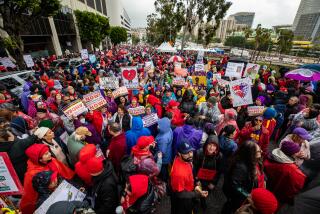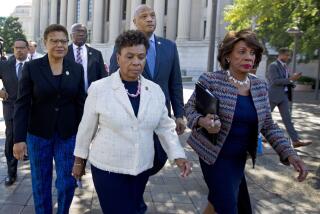Newton: Jan Perry’s path to power
An essential element of a successful political campaign, whether for U.S. president or mayor of Los Angeles, is that it identifies a path to victory. Candidates have to differentiate themselves from competitors and appeal to constituencies sympathetic to their message.
At this point in the Los Angeles mayor’s race, Councilwoman Jan Perry lags behind front-runners Wendy Greuel and Eric Garcetti in terms of money and name recognition, but in recent weeks she has found a potentially viable path.
Perry’s approach reflects an important feature of the field for this campaign: Controller Greuel and Councilman Garcetti, the leading candidates at this early stage, bring to the campaign virtually identical politics and similar temperaments. Both are personable, smart liberals with strong ties to organized labor. Greuel draws support from the International Brotherhood of Electrical Workers, the union that represents employees of the Los Angeles Department of Water and Power, while Garcetti is close to the Service Employees International Union, which represents some city and county workers and others in service industries.
Those relationships are likely to supply Garcetti and Greuel with volunteers and financial support, both vital to winning. But they also present Perry with an opportunity to set herself apart. Now that County Supervisor Zev Yaroslavsky and businessmen Austin Beutner and Rick Caruso have opted out of the campaign, Perry finds herself with a surprisingly open shot at becoming the favored candidate of business. As one longtime observer of this region’s politics remarked to me last week, “It’s the only way for her to go.”
Last week, Perry demonstrated that she’s gotten that message. Speaking to a small but welcoming audience at the Japanese American National Museum, Perry staked out her territory. She said she would oppose increases in sales and documentary transfer taxes — proposals that may appear on the same ballot as the mayoral contest’s first round in March. She argued for offloading some city assets, such as the Convention Center and zoo. And she insisted that the city’s budget problems — it faces a shortfall of more than $200 million this year, and the prognosis gets worse looking ahead — need to be addressed by asking city employees to contribute more to their medical coverage and pensions. That’s just what business wants to hear.
“I am a lifelong Democrat who is a business-friendly Democrat,” she said. By contrast, she said, her chief opponents will find it difficult to challenge City Hall’s status quo in areas such as rate increases and pension reform. “I think they both will have obligations that they will have to meet, one to IBEW, the other to SEIU.”
There is a fourth candidate who could plant his flag in this same area. Lawyer and radio personality Kevin James is campaigning at the race’s only true outsider. The same calculations that have raised Perry’s possibilities have increased his as well, but she has experience and credentials that will make it hard for him to head her off.
Perry is likable, with a refreshing candor. Last week, she slipped off her shoes as she delivered her speech and took questions from reporters until they had no more. And she didn’t exaggerate what is achievable: Asked whether she thought the city could rebound over the next four years, she said, basically, no.
But she has liabilities too. In 2007, she joined council colleagues — including Greuel and Garcetti — in voting for a salary increase that gave city workers more than 25% over five years. The deal was rendered insupportable when the economy tanked the next year, but it doesn’t take a Nobel laureate to see that not many workers in 2007 were getting deals that promised them annual salary increases of 5%. When I asked her if she regretted that vote, Perry laughed. “Yes,” she said. “Of course.”
Perry does have her share of enemies. She is famously stubborn — one joke kicking around the campaign is that she might have dropped out of this race and instead run for controller if only so many people hadn’t asked her to. And the demographic dynamics of her base are complicated. She’s African American and enjoys strong support from that important but relatively small community. She’s also, unbeknownst to many voters, Jewish, which supplies her either with a way to extend her base or to confuse it.
The business elites that supported Richard Riordan in the 1990s had hoped Beutner would run, and they have yet to fall in behind Perry. But they’re without a standard-bearer at the moment, and that could leave Perry with a powerful constituency, a coherent message — and a path.
Jim Newton’s column appears Mondays. His latest book is “Eisenhower: The White House Years.” Reach him at jim.newton@latimes.com or follow him on Twitter: @newton_jim.
More to Read
A cure for the common opinion
Get thought-provoking perspectives with our weekly newsletter.
You may occasionally receive promotional content from the Los Angeles Times.







